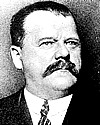Josef Reither

Personalia
Born:
Died:
Profession:
Persecution:
Imprisonment 13.03.1938 - 02.04.1938,
Dachau concentration camp 02.04.1938 - 27.09.1939,
Flossenbürg concentration camp 27.09.1939 - 02.03.1940,
Dachau concentration camp 02.03.1940 - 26.06.1941,
Imprisonment 22.07.1944,
Ravensbrück concentration camp 22.07.1944 - 15.01.1945,
Imprisonment 15.01.1945 - 22.04.1945
KZ Number:
Honors:
Grand Cross of the Austrian Order of Merit
Memberships
Curriculum Vitae
Josef Reither is one of the most striking personalities of the Austrian farming community. He was born on June 26, 1880 as the legitimate son of the farmer Josef Reither and Anna, née Mogg, in Langenrohr near Tulln, where he later took over his parents' farm. From an early age, he was active in public life for the concerns of the farming community. In 1907, at the age of 27, he founded a Raiffeisenkasse, and at 32 he became mayor of his home municipality. In 1909 he married Magdalena Schrack. He held the office of mayor until 1924. In 1922, Josef Reither was one of the founders of the Lower Austrian Chamber of Agriculture, initially taking on the role of Vice President and from 1925 that of President. In 1928, he was elected Chairman of the Lower Austrian Farmers' Association. During the corporative state, he was appointed President of the Austrian Reich Farmers' Association in 1934.
In addition to these functions in the representation of farmers' interests, Josef Reither also continued to be politically active: from 1921 to 1934, he was a member of the Lower Austrian state parliament. In 1925, he was elected to the provincial government and appointed deputy governor. He was elected governor in 1931, a position he held until 1938, interrupted in 1932/33 as deputy governor and in 1934/35 when he was appointed Federal Minister for Agriculture and Forestry, where he was only acting governor. During this time, he became a member of the secondary school fraternities Comagena Tulln and Aggstein St. Pölten, as well as the student fraternity Franco-Bavaria in Vienna.
Josef Reither is a fierce opponent of National Socialism and provincial chairman of the Vaterländische Front Niederösterreich. In this role, he vehemently opposed the German annexation plans. He was arrested on March 13, 1938, one day after the German Wehrmacht invaded Austria, and deported to the Dachau concentration camp on April 1, 1938 on the so-called 'Prominent Transport'. After his release on July 26, 1941, he lived under constant surveillance on his farm in Langenrohr. Despite this, he was able to make contact with resistance circles. A conspiratorial meeting took place in Judenau on May 4, 1944, attended by Leopold Figl and Edmund Weber, where future policy after the end of the war was discussed, among other things. As Josef Reither also had contacts with leading figures involved in the assassination attempt on Adolf Hitler on July 20, 1944, he was arrested again on July 22, 1944 and imprisoned in the Tulln district court. From there he was transferred to the Gestapo headquarters in Vienna at the Hotel Metropol. He was initially released twice for one day each in order to find out which suspicious persons he had made contact with. He is then deported to the Ravensbrück concentration camp and transferred from there to the Moabit prison in Berlin, where he meets the former governor of Salzburg, Franz Rehrl. On his way home from Berlin, he meets the Social Democrat Rosa Jochmann.
In Berlin, a skinny man spoke to us in Austrian dialect. He asked for a lift. I told him that we were only allowed to transport former concentration camp prisoners. 'I'm a concentration camp prisoner too,' the man replied. It was the former governor of Lower Austria, Josef Reither. He was one of those Christian Socialists who would have loved to build a bridge to the Social Democrats - just like Leopold Kunschak. Of course, we then took Josef Reither with us and assigned him the most beautiful seat [...].
Josef Reither returns to Vienna on July 10, 1945 after a stay in hospital at St. Hedwig's Hospital in Berlin and takes over the office of Governor of Lower Austria on October 15, 1945 from Leopold Figl, who had stood in for him in the meantime, until 1949. He becomes a member of the Austrian People's Party (ÖVP) and the ÖVP-Kameradschaft der politisch Verfolgten und Bekenner für Österreich, dies at the age of 69 in Tulln Hospital and is laid to rest in the cemetery in Langenrohr.
Places
Persecution:
Honoring:
Residence:
Citations
Krause, Peter/Reinelt, Herbert/Schmitt, Helmut (2020): Farbe tragen, Farbe bekennen. Katholische Korporierte in Widerstand und Verfolgung. Teil 2. Kuhl, Manfred (ÖVfStG, Wien) S. 278 - 280.
Matricula Online
